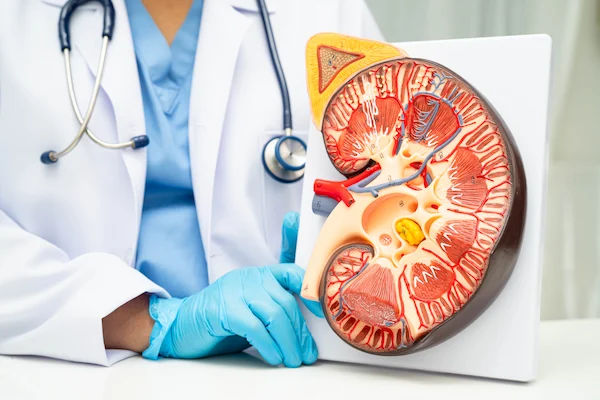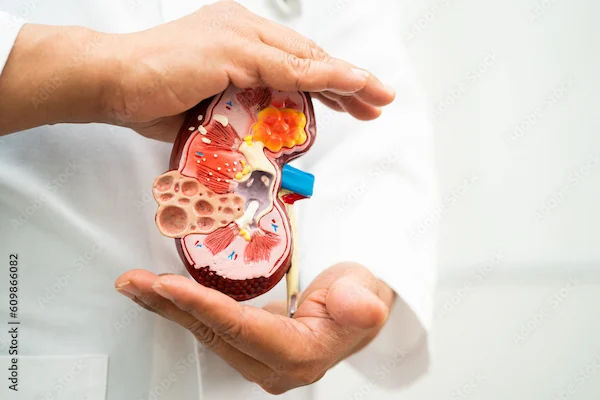Guide to Ensure Your Kidney Health During Pregnancy
Protect your kidneys during pregnancy with this essential guide. Learn about common risks, prenatal care tips, and signs to watch for to ensure a healthy pregnancy for both you and your baby.

Written by Dr. J T Hema Pratima
Reviewed by Dr. Dhankecha Mayank Dineshbhai MBBS
Last updated on 13th Jan, 2026

Introduction
Pregnancy is a beautiful journey that transforms your body in incredible ways. Among the hardest-working organs during this time are your kidneys. These two bean-shaped powerhouses take on a critical role, working overtime to filter waste for both you and your growing baby. Ensuring optimal kidney health is not just about your well-being; it's a fundamental part of a healthy pregnancy. This guide will walk you through why your kidneys are so vital, the common challenges they face, and the proactive steps you can take to protect them. We'll demystify conditions like preeclampsia and UTIs, explain the importance of prenatal tests, and empower you with knowledge for a smoother, healthier journey to motherhood. Think of this as your go-to resource for understanding and supporting your body's silent filtration system during these crucial nine months.
Why Do Your Kidneys Work Overtime During Pregnancy?
During pregnancy, your body undergoes a physiological marvel to support your baby. Your kidneys are at the center of this action, experiencing significant changes that are normal but require them to be in top shape.
The Increased Blood Flow and Filtration Demand
One of the most dramatic changes is the increase in blood volume. By the second trimester, your blood volume can be up to 50% greater than before you were pregnant. This means your kidneys are receiving and filtering a much larger quantity of blood every minute. The measurement of this filtration rate, called the Glomerular Filtration Rate (GFR), increases substantially. This heightened workload is efficient but can also make your kidneys more susceptible to stress if there are underlying issues.
Hormonal Changes and Their Impact on Kidney Function
Pregnancy hormones, particularly progesterone, cause relaxation of smooth muscles throughout the body, including the ureters (the tubes connecting the kidneys to the bladder). This can slow the flow of urine from the kidneys to the bladder. Combined with the pressure of the growing uterus, this can lead to a condition called hydronephrosis—a mild dilation of the kidneys and ureters that is common in pregnancy. While usually harmless, it can sometimes increase the risk of urinary stasis and infection. Understanding these changes helps explain why symptoms like frequent urination are normal, while others warrant medical attention.
Consult Top Specialists
Common Kidney-Related Conditions in Pregnancy
Being aware of potential kidney-related issues is the first step toward prevention and early detection.
Urinary Tract Infections (UTIs): More Than Just a Nuisance
UTIs are one of the most common bacterial infections during pregnancy. The hormonal and physical changes mentioned above create an environment where bacteria can multiply more easily. A simple bladder infection (cystitis) can quickly ascend to the kidneys, causing a more serious kidney infection (pyelonephritis). Pyelonephritis during pregnancy is associated with risks like preterm labor and low birth weight. This is why routine urine tests at prenatal visits are so crucial—they can detect asymptomatic bacteriuria (bacteria in the urine without symptoms), which is treated to prevent a full-blown infection. Signs of kidney problems during pregnancy often start with a UTI: burning during urination, pelvic pressure, or an urgent need to go.
Preeclampsia: Understanding the Kidney-Blood Pressure Link
Preeclampsia is a serious condition characterized by high blood pressure and signs of damage to another organ system, most often the kidneys, after 20 weeks of pregnancy. The kidneys' filtering systems become stressed, allowing protein to leak into the urine (proteinuria). This is why your doctor routinely checks your blood pressure and tests your urine for protein. The exact cause is unknown, but it highlights the intimate connection between cardiovascular and renal function. Managing preeclampsia is vital for the health of both mother and baby and may require medication and close monitoring.
Gestational Diabetes and Kidney Stress
Gestational diabetes mellitus (GDM), high blood sugar that develops during pregnancy, can also affect the kidneys. Consistently high blood sugar levels can damage the tiny blood vessels in the kidneys' filtering units. While this damage (diabetic nephropathy) typically develops over many years, pregnancy can unmask a predisposition or add stress to the kidneys. Controlling blood sugar through diet, exercise, and sometimes medication is essential not only for fetal health but also for protecting your long-term kidney health.
Pre-existing Kidney Conditions and Pregnancy Planning
For women with pre-existing kidney conditions, a planned pregnancy with specialist guidance is paramount.
Chronic Kidney Disease (CKD) and Pregnancy Risks
The effect of pregnancy on chronic kidney disease depends on the stage and severity of the disease. Women with mild CKD (Stage 1-2) and normal blood pressure often have successful pregnancies but require very close monitoring. However, pregnancy can accelerate the progression of CKD in some cases, especially if there is significant reduction in kidney function or uncontrolled hypertension. Risks for the mother include worsening high blood pressure and preeclampsia, while risks for the baby can include preterm birth and growth restriction.
The Importance of Preconception Counseling
This cannot be overstated. Preconception counseling with a nephrologist (kidney specialist) and a high-risk obstetrician (maternal-fetal medicine specialist) is essential. They will assess your kidney function through blood tests (like creatinine levels) and urine tests, optimize blood pressure control, and adjust medications to those safest for pregnancy. This proactive approach maximizes the chances of a healthy pregnancy and helps you make informed decisions. If you have a known kidney condition, consulting a specialist online with Apollo24|7 for preconception advice is a highly recommended first step.
Proactive Steps: How to Protect Your Kidney Health
Empowerment comes from action. Here are key strategies to support your kidneys throughout your pregnancy.
Nutrition for Healthy Kidneys: What to Eat and Avoid
A balanced diet is your first line of defense. Focus on:
- Lean Proteins: Fish, chicken, and plant-based proteins like lentils are easier on the kidneys than red meat in large quantities.
- Fresh Fruits and Vegetables: They provide essential vitamins, antioxidants, and fiber.
- Limit Sodium: Excess salt can contribute to high blood pressure and edema. Avoid processed foods and added salt.
- Moderate Potassium & Phosphorus: For most women, this isn't an issue, but if you have advanced CKD, your doctor may advise monitoring these minerals.
The Power of Hydration: Drinking Enough Water
Staying well-hydrated is one of the simplest and most effective ways to prevent UTI when pregnant. Adequate water intake helps dilute your urine and ensures a steady flow, flushing bacteria out of your urinary system before an infection can take hold. Aim for 8-10 glasses of water a day, but listen to your body and adjust as needed.
The Role of Regular Prenatal Check-ups and Tests
Do not skip your appointments. These visits are designed to catch issues early. The blood pressure monitoring and urine dipstick tests are quick, non-invasive, and incredibly informative. Blood tests to check your serum creatinine levels give a direct snapshot of your kidney function. Apollo 24|7 offers a convenient home collection for tests like these, making it easier to stay on top of your health without extra travel.
Warning Signs: When to Contact Your Doctor
While some discomfort is normal, certain symptoms require immediate medical attention. Contact your doctor if you experience:
- Pain or Burning During Urination: A classic sign of a UTI.
- Blood in Your Urine (Hematuria): This can indicate an infection, kidney stones, or other issues.
- Significant Swelling (Edema): Particularly in your hands, face, and around your eyes, especially if it appears suddenly.
- Persistent Headaches, Vision Changes, or Upper Abdominal Pain: These can be signs of preeclampsia.
- A Significant Decrease in Urine Output.
- High Fever with Chills and Back Pain: This could signal a kidney infection.
If any of these symptoms persist, consult a doctor online with Apollo 24|7 for further evaluation and guidance on the next steps.
Conclusion
Navigating the changes of pregnancy can feel overwhelming, but understanding the role of your kidneys provides a clear path to proactive care. By recognizing the increased demands on these vital organs, you can partner effectively with your healthcare team. Attending all prenatal appointments, maintaining a healthy lifestyle, and being vigilant about potential signs of kidney problems are the cornerstones of protecting your well-being and ensuring the best possible start for your baby. Remember, you are not just growing a new life—you are nurturing your own. Embrace this journey with knowledge and confidence, and never hesitate to seek professional advice when needed.
Consult Top Specialists
Consult Top Specialists

Dr. Manju Kamal
Nephrologist
12 Years • MBBS,MD(General Medicine), DNB,DM(Nephrology)
Angamaly
Apollo Hospitals Karukutty, Angamaly
Dr. S Krishnan
Nephrologist
22 Years • MBBS, MD, DNB(Nephro)
Secunderabad
Apollo Hospitals Secunderabad, Secunderabad

Dr. Jai Kumar Kriplani
Nephrologist
13 Years • M.D. (Medicine), DNB (Nephrology)
Indore
Apollo Hospitals Vijay Nagar, Indore
(50+ Patients)

Dr. Sunil Jawale
Nephrologist
17 Years • MBBS, MD (Internal Medicine), DM (Nephrology)
Pune
Apollo Hospitals Pune, Pune

Dr. Vamsee Priya Marina
Nephrologist
13 Years • MBBS, MD (Internal Medicine), MD (Nephrology), Diplomate American Board of Internal Medicine
Hyderguda
Apollo Hospitals Hyderguda, Hyderguda
(50+ Patients)
Consult Top Specialists

Dr. Manju Kamal
Nephrologist
12 Years • MBBS,MD(General Medicine), DNB,DM(Nephrology)
Angamaly
Apollo Hospitals Karukutty, Angamaly
Dr. S Krishnan
Nephrologist
22 Years • MBBS, MD, DNB(Nephro)
Secunderabad
Apollo Hospitals Secunderabad, Secunderabad

Dr. Jai Kumar Kriplani
Nephrologist
13 Years • M.D. (Medicine), DNB (Nephrology)
Indore
Apollo Hospitals Vijay Nagar, Indore
(50+ Patients)

Dr. Sunil Jawale
Nephrologist
17 Years • MBBS, MD (Internal Medicine), DM (Nephrology)
Pune
Apollo Hospitals Pune, Pune

Dr. Vamsee Priya Marina
Nephrologist
13 Years • MBBS, MD (Internal Medicine), MD (Nephrology), Diplomate American Board of Internal Medicine
Hyderguda
Apollo Hospitals Hyderguda, Hyderguda
(50+ Patients)
More articles from Kidney Disease
Frequently Asked Questions
Is it normal to have protein in urine during pregnancy?
A tiny trace can be normal, but a significant amount (proteinuria) is not. It's a key sign of preeclampsia. Your doctor will monitor this closely at each prenatal visit. The causes of protein in urine during pregnancy are primarily related to stress on the kidney's filtering system.
How much water should I drink to prevent UTIs?
Aim for 8-10 glasses (about 2-2.5 liters) per day. This helps flush bacteria from your urinary tract. If you are active or it's hot, you may need more. The goal is to keep your urine pale yellow.
Can pregnancy cause long-term kidney damage?
For most women with healthy kidneys, pregnancy does not cause long-term damage. However, women who develop severe preeclampsia or have a pre-existing kidney condition may have a slightly increased risk of future kidney issues, highlighting the importance of postpartum follow-up.
What is a safe blood pressure reading for a pregnant woman?
A reading below 120/80 mm Hg is generally considered ideal. Consistently readings at or above 140/90 mm Hg are classified as hypertensive disorders in pregnancy and require medical management.
I had a kidney stone before pregnancy. Am I at higher risk during pregnancy?
Pregnancy itself doesn't necessarily increase the risk of forming new stones, but the changes in the urinary tract can make pre-existing stones more symptomatic. If you have a history of stones, discuss it with your obstetrician.

_3.webp)
_2.webp)

